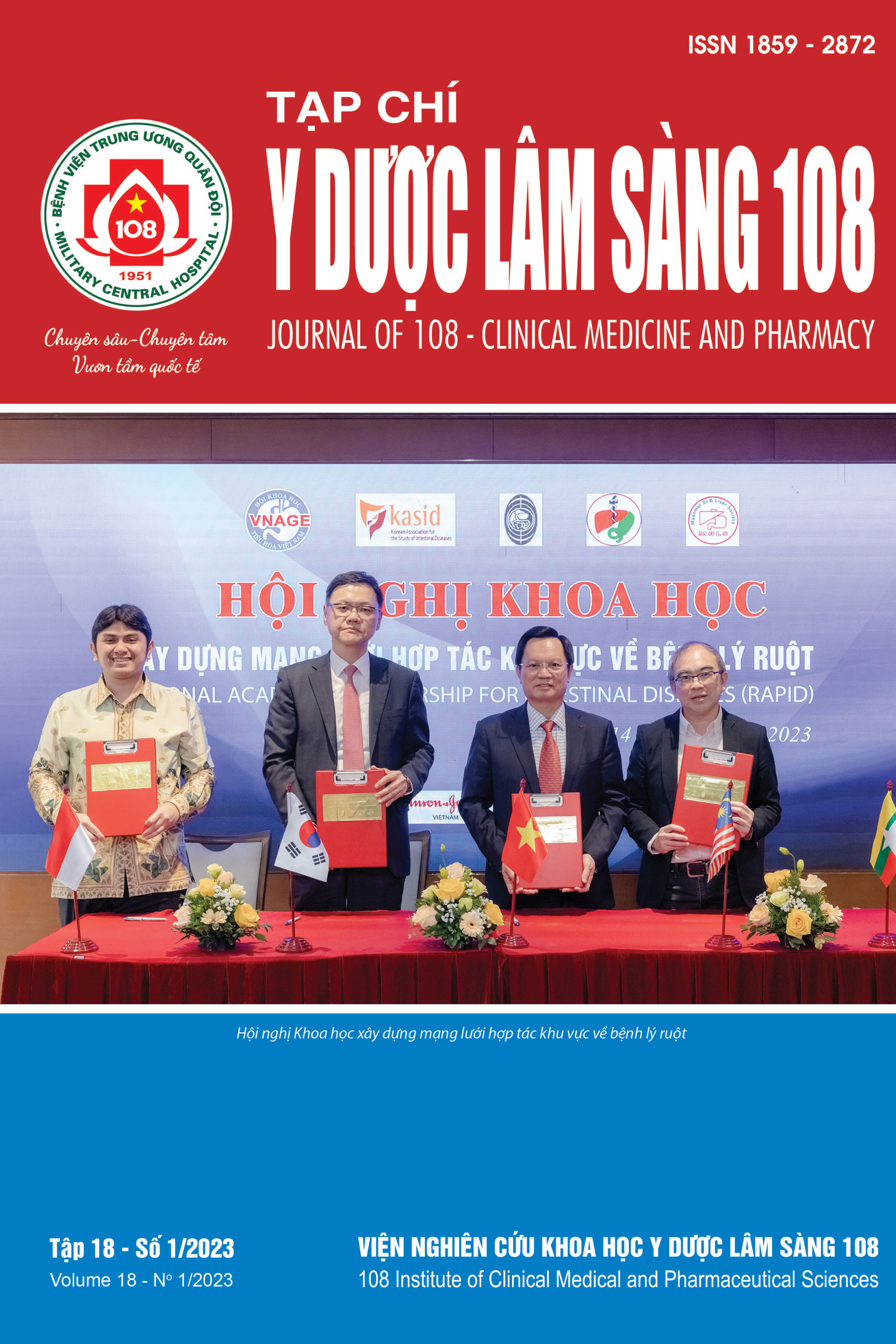Evaluation of the resutls of cardiac shock wave therapy for 6 months in treatment ischemic heart disease
Main Article Content
Keywords
Abstract
Objective: To evaluate of the results of cardiac shock waves therapy for 6 months in treatment ischemic heart disease. Subject and method: A prospective, cross-sectional study with comparison and follow-up for 6 months on 65 ischemic heart disease patients with refractive angina pectoris according to criteria of ESC 2013 managed at Internal Cardiology Department of the 108 Military Central Hospital from March 2015 to March 2021. The following parameters will be evaluated including symptoms of angina and the exercise tolerance, breathlessness, echocardiography and myocardial perfusion imaging after 6 months. Result: The symptoms of angina improved signif icantly (amount of chest pain 6.26 ± 2.59 to 0.58 ± 0.56 times; using of nitroglycerin reduced per week from 6.34 ± 2.62 to 0.6 ± 0.55 times/week). The 6-minute walking test all improved (280.8 ± 71.1m compared with 388.6 ± 44.4m). CCS angina class improved significantly CCS 3 (59.46% to 0%), CCS 4 (16.92% to 0%). In the group with heart failure, NYHA grade improved significantly (NYHA III from 13.85% to 1.54%, NYHA IV was no more cases). NT-proBNP decreased (942.75 ± 1618.37 to 410.45 ± 461.54pg/ml). EF Simpson's after treatment (48.48 ± 10.57%) was higher than before treatment (43.89 ± 12.27%). Wall motion septal index (WSMI) decreased from 1.54 ± 0.18 to 1.28 ± 0.15). GLS improved from -10.28 ± 2.82 to -12.48 ± 2.67. After treatment average score of SSS (17.45 ± 8.61 versus 12.18 ± 7.89); SRS (11.09 ± 7.74 versus 9.46 ± 7.23), SDS (4.37 ± 2.31 versus 2.57 ± 1.56), markedly improved with p<0.05. The degree of severe perfusion defect and the wide perfusion defect area decreased significantly after treatment by 46.2% to 12.3% and 60% to 26.2%, respectively. There was no rise of cardiac enzymes and complicated arrhythmias were not observed during the study period. Conclusion: The treatment of ischemic heart disease by cardiac shock wave therapy has obvious efficacy.
Article Details
References
2. Conrado I (2019) Shock wave therapy improves myocardial blood flow reserve in patients with refractory angina: Evaluation by real-time myocardial perfusion echocardiography. J Am Soc Echocar 32: 1075-1085.
3. Alunni G, Barbero U, Vairo A, D'Amico S, Pianelli M, Zema D, Bongiovanni F, Gaita F (2017) The beneficial effect of extracorporeal shockwave myocardial revascularization: Two years of follow-up. Cardiovascular Revascularization Medicine 18: 572-576.
4. Čelutkienė J, Burneikaitė G, Shkolnik E, Jakutis G, Vajauskas D, Čerlinskaitė K, Zuozienė G, Petrauskienė B, Puronaitė R, Komiagienė R, Butkuvienė I, Steponėnienė R, Misiūra J, Laucevičius A (2019) The effect of cardiac shock wave therapy on myocardial function and perfusion in the randomized, triple-blind, sham-procedure controlled study. Cardiovasc Ultrasound 17(1): 13.
5. Faber L, Lindner P (2014) Echo-guied extracoporeal shock wave therapy for refractory angina improves region myocardial blood flow and longgitudinal segmental left ventricular function. ESC Congress 2014, Barcelona, Spain.
6. Medispec (2006) Operating Manual CS2X400. Germantown, Maryland, USA.
7. Prasad M, Wan Ahmad WA, Sukmawan R, Magsombol EB, Cassar A, Vinshtok Y, Ismail MD, Mahmood Zuhdi AS, Locnen SA, Jimenez R, Callleja H, Lerman A (2015) Extracorporeal shockwave myocardial therapy is efficacious in improving symptoms in patients with refractory angina pectoris - a multicenter study. Coronary Artery Disease 26(3): 194-200.
8. Montalescot G, Sechtem U (2013) 2013 ESC Guidelines on the management of stable coronary artery disease. Eur. H. Journal 34: 2949-3003.
9. Nirala S Wang Y, Peng Y-Z, Yang P, Guo T (2016) Cardiac shock wave therapy shows better outcomes in the coronary artery disease patients in a long term. Eur Rev Med Pharmacol Sci 20(2): 330-338.
10. Takakuwa Y, Sarai M, Ozaki Y (2017) Extracorporeal shock wave therapy for coronary artery disease: Relationship of symptom amelioration and ischemia improvement. Asia Ocean J Nucl Med Biol 6(1): 1-9.
11. Vainer J, Habets J, Schalla M, Lousberg A (2016) Cardiac shockwave therapy in patients with chronic refractory angina pectoris. Neth Heart J, 24.
12. Wang Yu, Peng Yunzhu, Yang Ping, Cai Hong Yan, Tao Siming (2014) Extracoporeal Cardiac Shock Wave Therapy (CSWT) for treatment of coronary artery disease in China. Glosal Jounals Inc 14(4): 21.
 ISSN: 1859 - 2872
ISSN: 1859 - 2872
